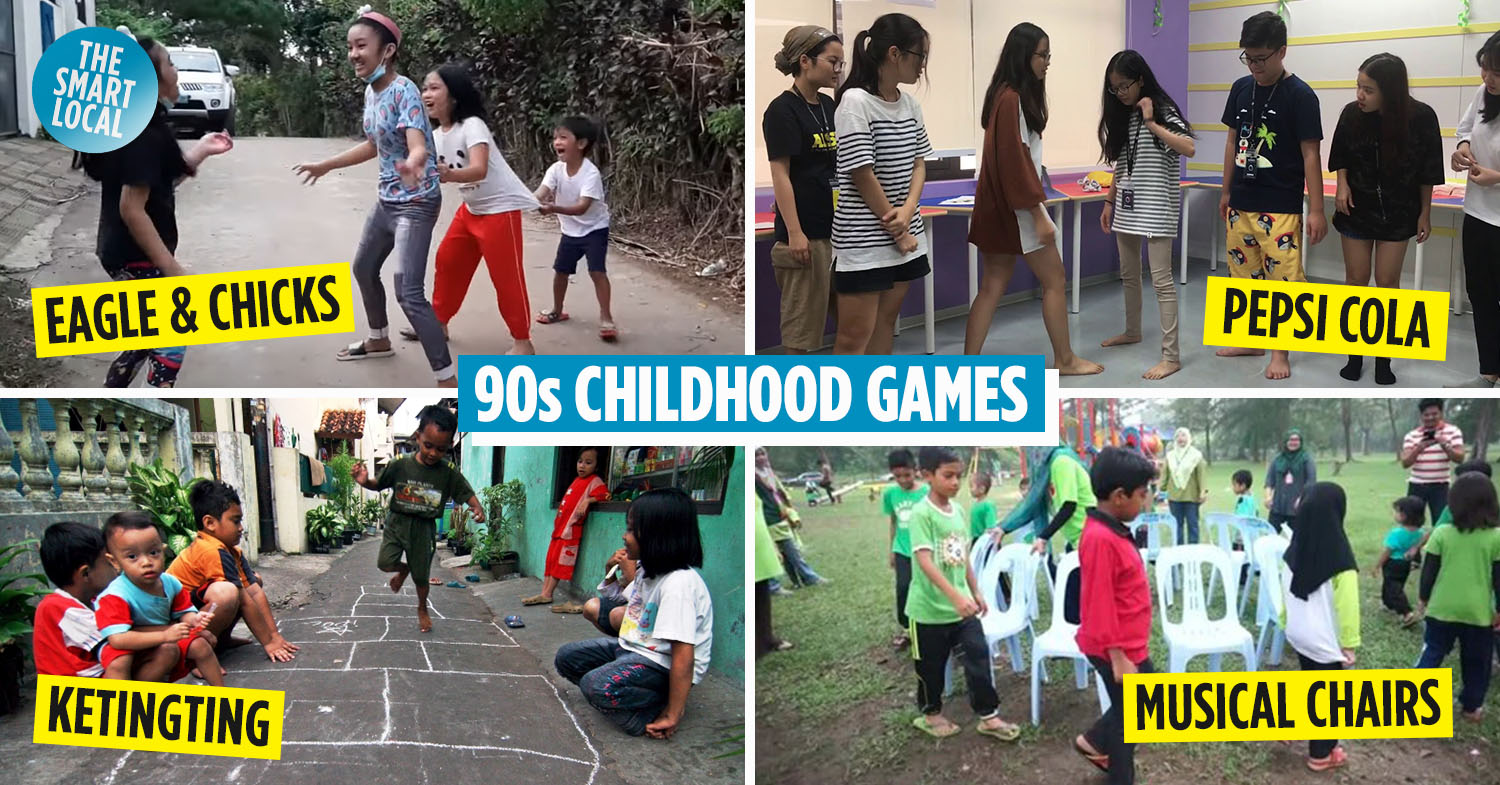Malaysian childhood games
Digital games are all the buzz nowadays among kids, as they live in a world with an overwhelming number of computer and mobile games to choose from and switch between whenever they feel like it. But back in the 90s, children spent much of their time playing games with their siblings or friends rather than staring at an electronic screen.
As millennials, we arguably had one of the best childhoods because there were so many fun games from our time that required little to no equipment. So, for a quick throwback to the times when we had nothing but lots of fun sans the internet, we gathered 12 nostalgic childhood games played in 90s below.
1. Batu Seremban
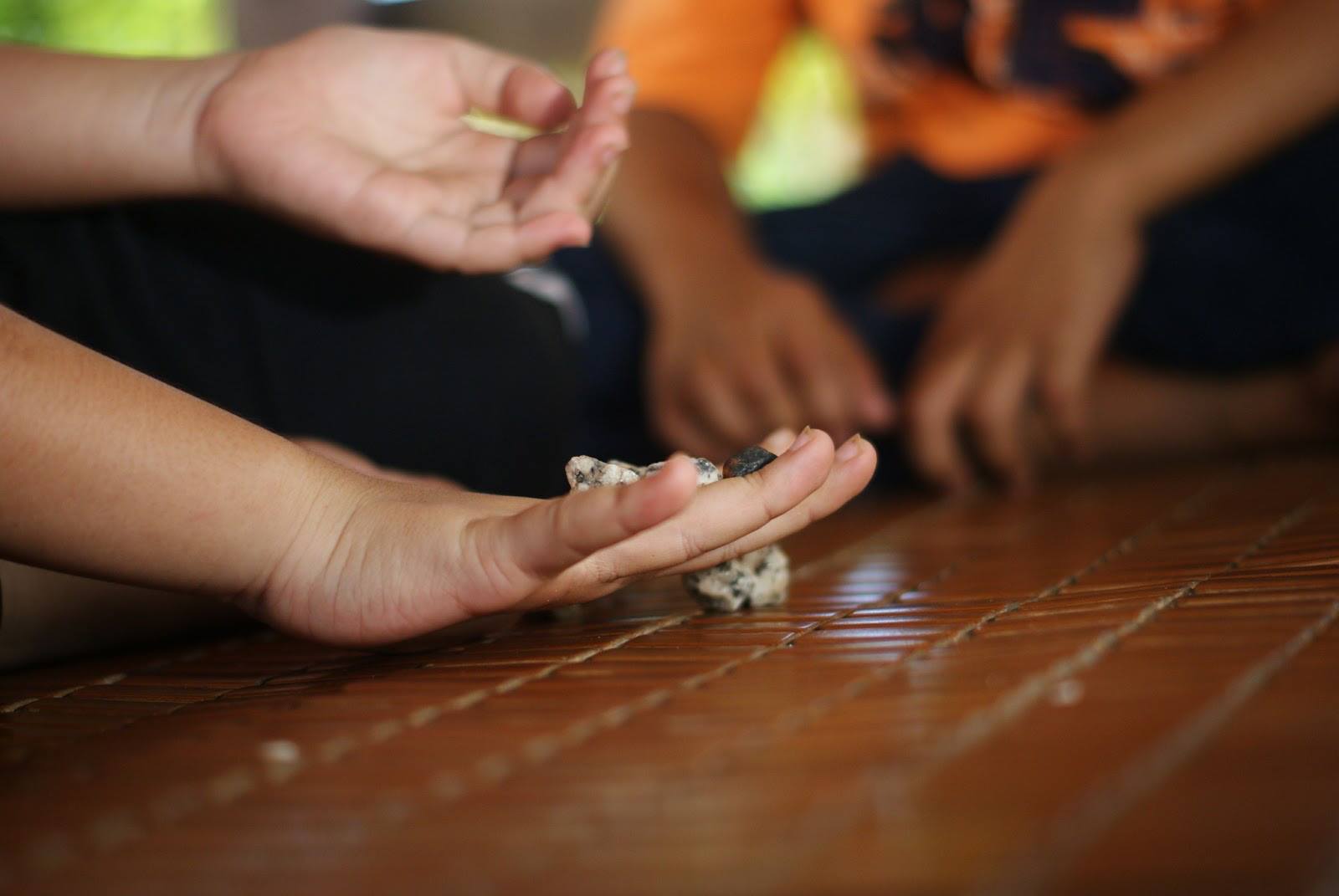
Image credit: Travelling Shoes Malaysia
Batu Seremban or five stones is one of the most common childhood games played by millennials growing up. It is a traditional game usually played by girls, individually or in small groups, and is ideally played among those with siblings around their age group.
This is one of the most popular games from the 90s, as it can be easily played with items that can be found in or around one’s house such as seeds, stones, pebbles, or any small round object. The game has varying levels of difficulty, which makes it a fun pastime for kids who didn’t grow up with technology.
How to play: This game is played by tossing a stone in the air and catching the remaining stones on the ground one by one, until all of the stones are collected in your palm.
2. Eagle and chicks

Image credit: Gabby & Sitti Silan
Mention eagle and chicks, or eagle hunting chicks, and everyone instantly smiles – that’s how fun it was to play this game. This defensive game is played in small groups, with participants having to strategise and protect individuals from the ‘villain’.
Back in the 90s, this game was likely the source of all the noise that came from kids during recess at school.
How to play: One player acts as the eagle trying to hunt chicks under a mother chicken’s care. The mother is usually someone who is older or bigger in size, and will guard the other players (chicks) from being hunted by the eagle (villain).
Players would have to hold onto each other’s T-shirts to form a line and follow the mother chicken’s direction. The one playing the mother would need to actively wave their arms and hands to defend the chicks from being snatched away by the hungry eagle.
3. Congkak
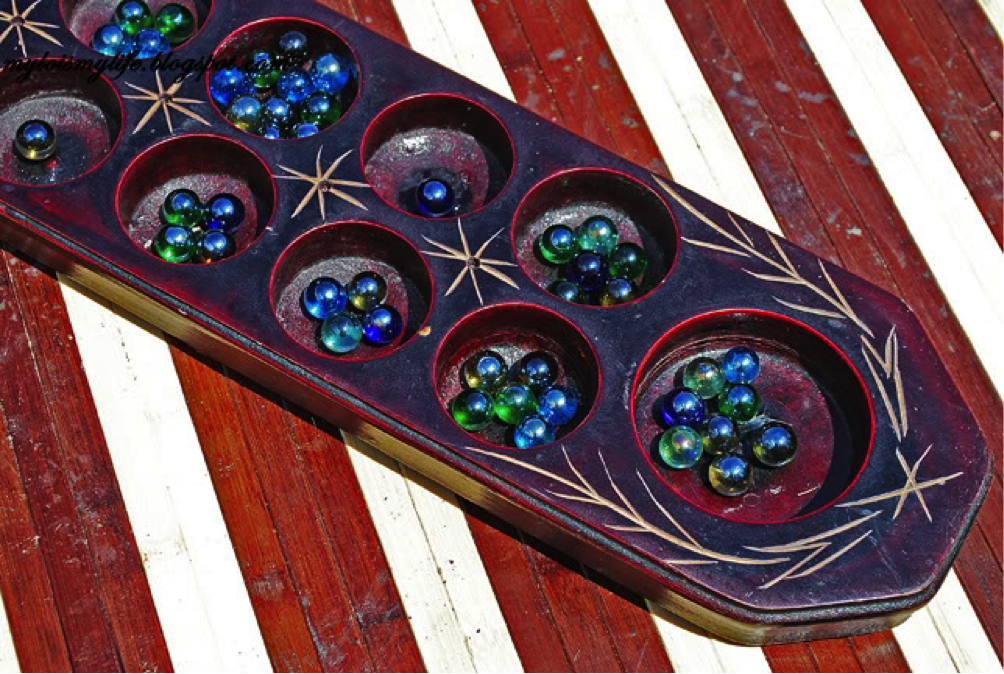
Image credit: Vee Kie
Congkak is a traditional Malay mancala game played indoors as a great pastime for children, and even as a competitive game in schools as it requires great agility and logical thinking. It is played by distributing marbles, seeds, or shells equally into small holes called ‘houses’ of a congkak board, leaving the bigger one or ‘storehouse’ empty.
How to play: Players begin playing by simultaneously scooping seeds from their own houses to distribute them into their houses and the storehouse, seed by seed. The game continues until the opponent’s houses become empty, and a winner is decided upon by the most amount of seeds collected in their storehouse.
4. Eraser battle
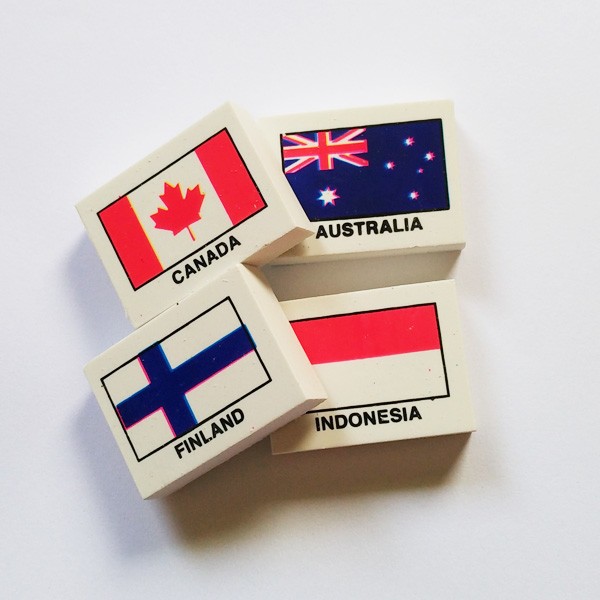
Image credit: Shopee
Millennials had one of the best childhoods because they grew up with unforgettable childhood things – one such item is a flag eraser. This old-school stationery wasn’t just used to erase pencil marks, but as items to play games with.
The eraser battle is a popular game played in schools, especially among boys who’d challenge their peers whenever possible. When the teacher was out of sight, you’d likely find at least two students busy battling each other with their erasers in the classroom.
How to play: Playing the eraser battle is as easy as counting one, two, three. Players flip their erasers on the table or any flat surface, hoping to land them on top of their opponent’s eraser. The first person to succeed is declared the winner.
This game can be played for as many rounds as possible, and with as many as 10 able to join a game at once.
5. Musical chairs
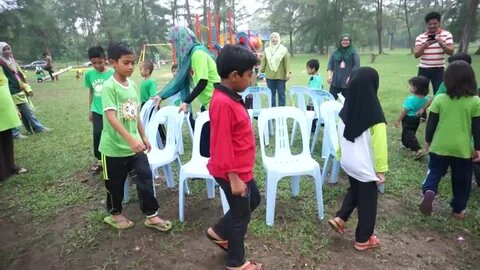
Image credit: Shutterstock
Musical chairs is a game of elimination that has been passed down to us millennials from our boomer parents. It involves players, chairs, and music, and is the go-to option whenever a large group of children wants to play a game together. It’s also popularly played during school events and camping trips, so a lot of us have fond memories of the game – including winning and losing to our peers.
How to play: The game starts when players go around a circle of chairs that are arranged close to one another. A moderator plays music and the players start moving. When the music stops, players have to quickly take a seat on any of the empty chairs.
The one left without a chair to sit on is eliminated from the game. The game continues until only two players are left in the final round, and the one who snags a seat first on the last remaining chair is crowned the winner.
6. Pepsi Cola
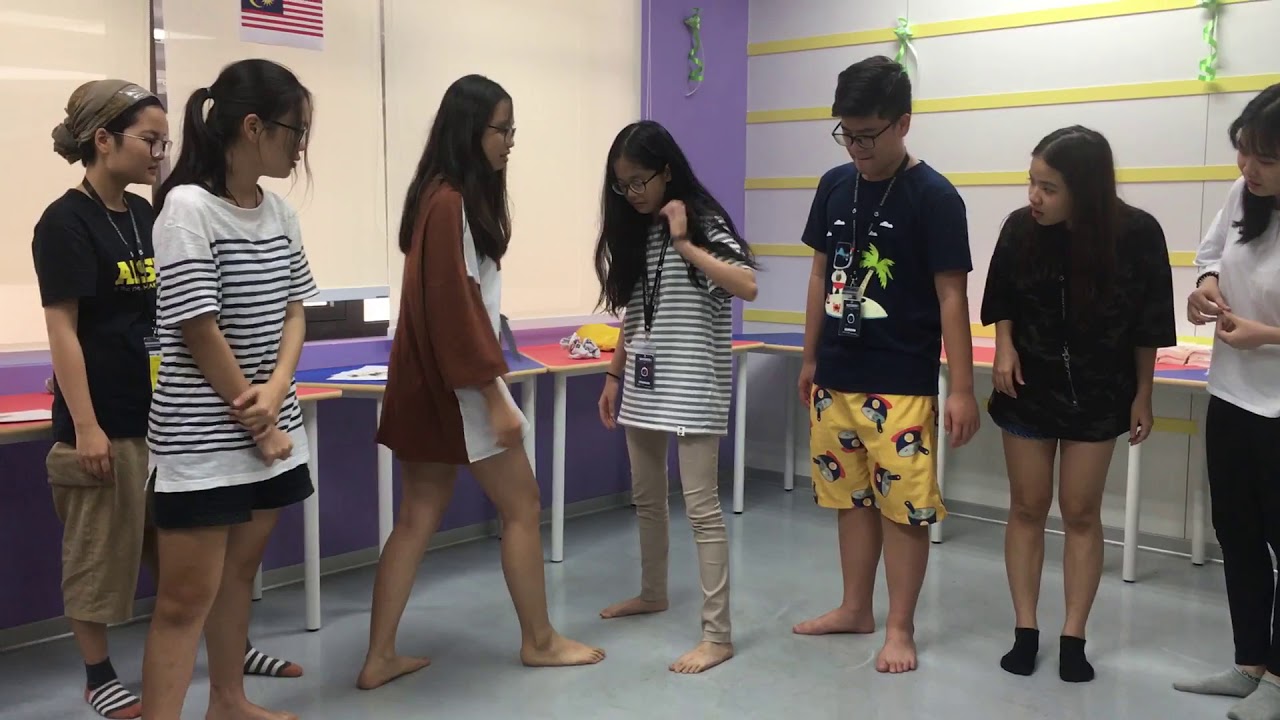
Image credit: TengHao Ooi
Pepsi-cola, Pepsi-cola, who wants to be the number one? This familiar chant was part of a fun game called Pepsi Cola. It’s an elimination game often played in groups, especially in schools and among younger family members when group gaming without gadgets was still a thing.
The surprise element in the game makes it totally enjoyable for everyone in the group.
How to play: Players gather around in a circle and start singing the ‘Pepsi Cola’ song before jumping three steps backwards to create enough space for everyone to move around. The first player starts the game by jumping and trying to kick or step on the foot of the next player, who must avoid it to stay in the game.
Players stay in the same position until one person knocks out every other person, and becomes the winner.
7. Lat tali lat

Image credit: Nina Nadira
Back in the day, Malaysians invented their own voting system to determine who goes first in a game. Lat tali lat is a perfect example of a uniquely Malaysian voting system among kids growing up, who played this hand game to single out a person from a group or divide members into teams.
How to play: This game is uniquely Malaysian because of the rhyme that children used to chant when making the toss. Three or more players stand in a circle, put out one hand and start making hand-fanning motions – akin to spreading jam on a slice of toast – while singing “Lat tali lat tali tamplom”.
At the end of the rhyme, players put their hands flat out either facing upwards or downwards. The player with the odd palm in the group wins or loses depending on the situation.
8. Rubber band skipping rope
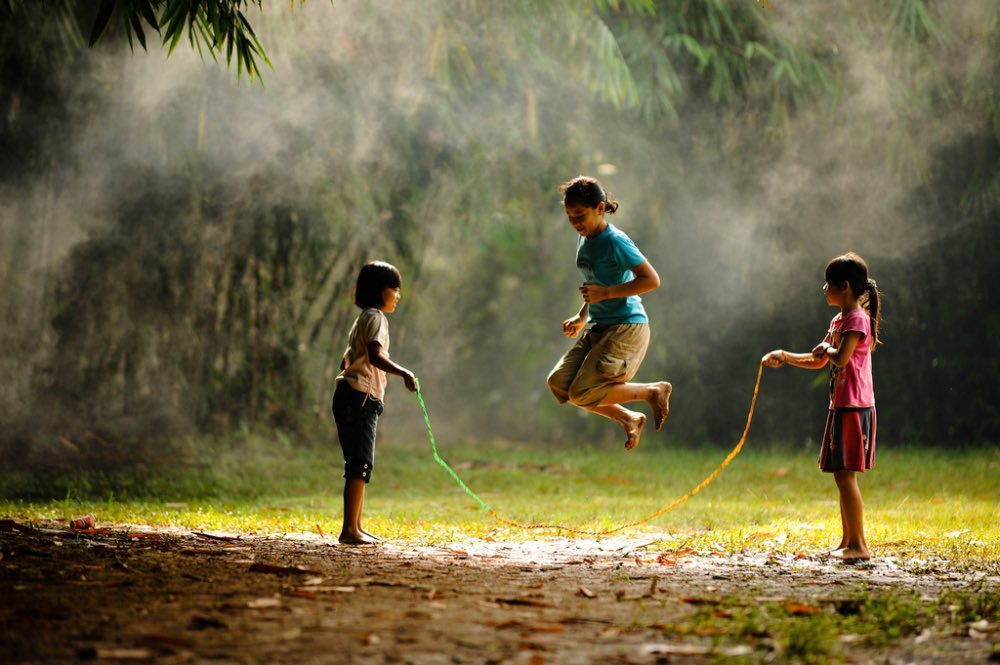
Image credit: @MyMOTAC
The 90s was a time when kids who owned store-bought toys such as a jump rope were the envy of others. Nonetheless, the average Malaysian kid made do with some creativity and the help of readily-available household items such as rubber bands.
The rubber band skipping rope is essentially skipping rope, but played by three people and with a rope made by joining rubber bands together. It was popular back then as many children could only have access to jump ropes at school.
So, when they want to play the game at home, dozens of rubber bands came in handy.
How to play: Rubber bands are joined together to form a long chain, with each end held by two people, while one person stands in the middle.
As the chain is swung around the player in the middle jumps to avoid stepping on the rope. The game gets really fun when the chain is swung quickly to increase the level of difficulty for the player in the centre.
9. Ketingting
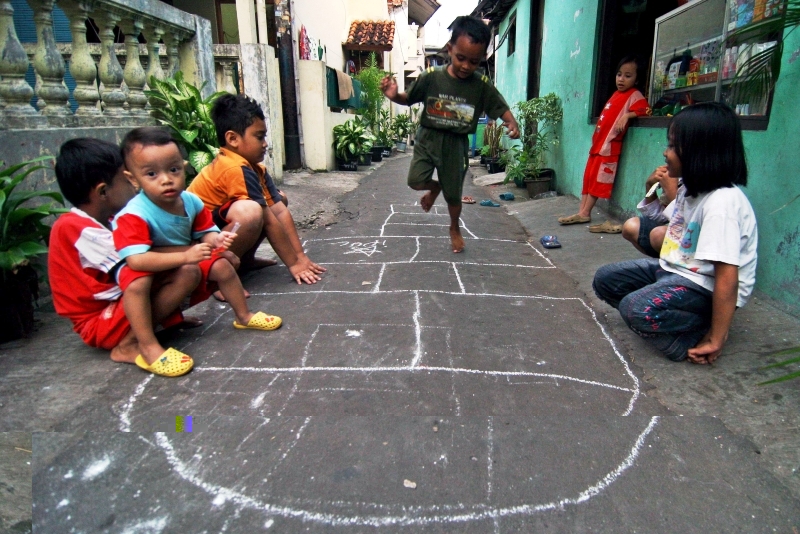
Image credit: Permainan Khas Malaysia
A lot of people know it as hopscotch in English, but it is more familiarly known as ting ting or ketingting to Malaysian millennials. Ketingting is the Malaysian version of hopscotch and is often played by three or more people.
This game was popular because it can be played easily in one’s backyard or on the porch. It is a competitive game that has strict rules, which makes it totally fun to play. Back in the day, kids would often sneak chalks from their classrooms to play hopscotch at home with siblings or friends.
How to play: This game is played by drawing a hopscotch diagram, made of numbered rectangles and a semicircle, with chalk. Players would toss a gundu, which is a small object, into the rectangles starting from the first and start hopping with one foot.
The game continues until a player completes all nine circles and successfully makes a house on the rectangles. The player with the most number of houses wins.
10. Conquer
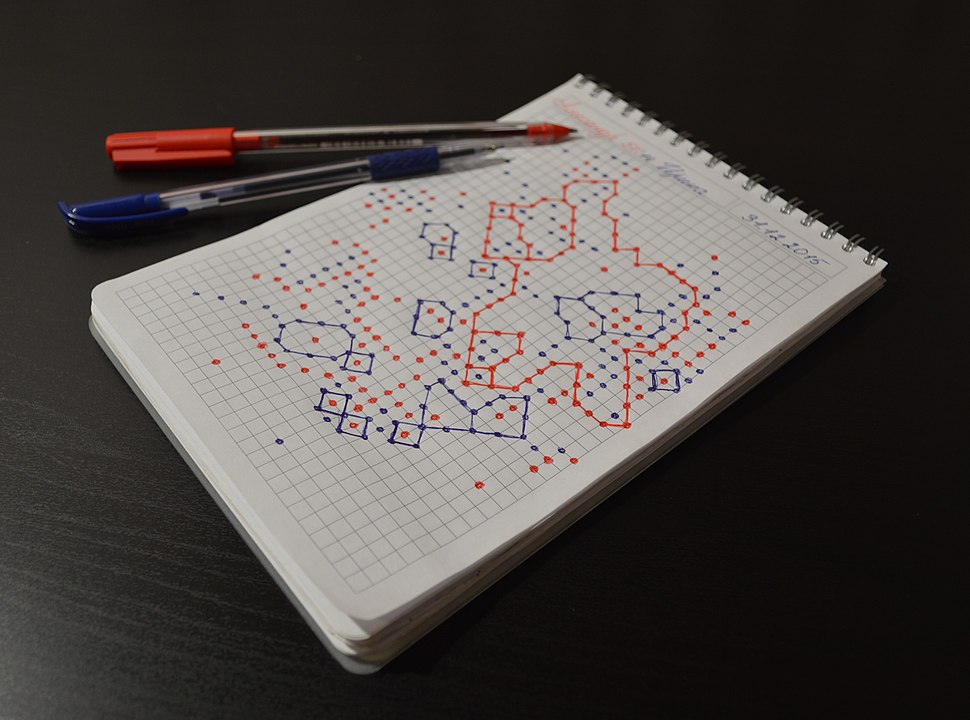
Image credit: Wikipedia
Among the many things that millennials did as a pastime with friends at school was playing this game using their notebooks. Called Conquer or dots, this game is played by two people using different coloured pens on a squared paper.
It was popular as it didn’t require many tools, and also considering the fact that students didn’t have much options for entertainment in school. So, many would actually use the last pages of their Mathematics exercise books to play this game whenever there was free time.
How to play: The game begins with players strategically placing dots on a squared paper to capture as many dots of the opposite colour as possible. It is done by drawing lines to connect the dots. The more dots one has within their territory, the higher their chance of winning.
11. One Two Jus
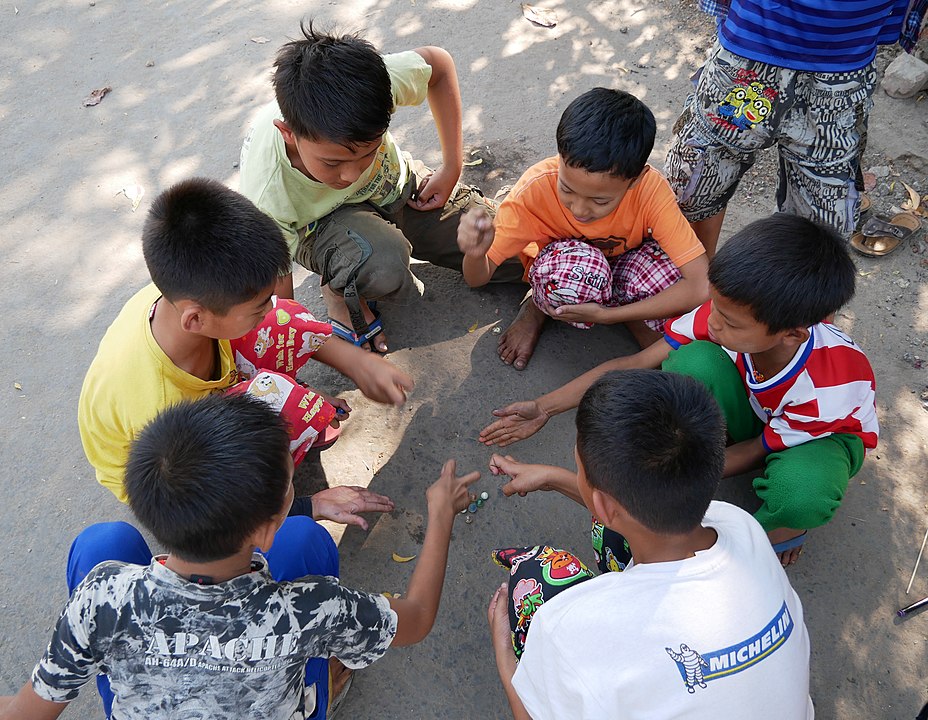
Image credit: Wikipedia
We all remember the good ol’ days when we used to play One, Two, Jus to determine who gets to start first in a game or any other challenge. It’s Malaysia’s version of Rock Paper Scissors, but it’s often called One, Two, Jus because English wasn’t the first language for most of us. So, we played by a familiar term.
How to play: One, Two, Jus is really a short game that can be played on its own, or before starting another game to determine the turn of each player.
Players toss their hands out in different formations, mimicking scissors (the peace sign), a stone (a fist) or paper (a flat hand). The player who shows the sign that’s superior to their opponent’s wins. It is worth noting that paper in another Malaysian version of this game is often replaced by water, and the scissors by bird.
12. Card games
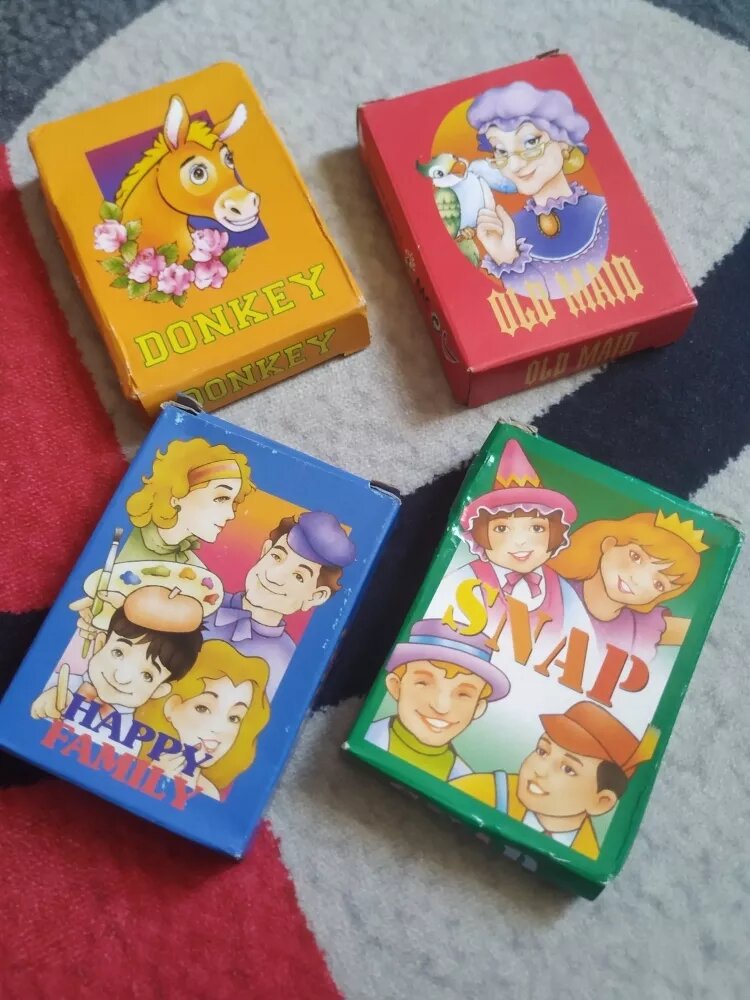
Image credit: iknowaina / Lazada
Before the arrival of computer-based games, card games were really popular among kids as they were super cheap and the rules for them could be understood in just under 5 minutes. During the 90s, there were various card games that one could choose to play such as Donkey, Old Maid, Happy Family, and Snap.
The games could be played by purchasing cards from nearby marts or convenience stores in one’s neighbourhood. Each deck of cards cost no more than RM5, and comes with its own set of rules.
How to play: Generally, the player loses when he or she ends up with the last card in each deck or is unable to complete the game. These card games are one of those games that truly depend on one’s luck.
Bonus: Milo Ais
Malaysians love Milo, especially when we were kids. Many of us can easily recall those happy times when we used to queue up for free Milo from the Milo van. As 90s kids, we used to chant Milo Ais, a game that is played with a chant inspired by the famous chocolate drink.
For the uninitiated, Milo Ais is a hand-clapping game that is widely played by millennial kids. It is played among individuals by clapping hands with one another while singing a song – which goes like this: Sep sep sep, tom tom tom, Milo ais, butterfly, bird, bird, kangkung, Mi-Lo, MILO!
How to play: The game starts out slow but eventually picks up momentum, with players required to clap hands quickly while singing the song. The first one to point the index finger towards the other player, at the end of the song, is the winner. So, if you snooze you lose.
This is one of those unique games that brings back nostalgic childhood memories, as it incorporates everyday things like Milo ais, kangkung, and butterfly into a song.
Malaysian childhood games
From Batu Seremban to card games, the 90s childhood experience is simply a time irreplaceable by today’s technology – no matter how convenient life has become because of them.
Although times have changed and we now spend less time interacting with each other physically through fun games, these nostalgic games will always remind us of an amazing childhood that we had that shall be cherished forever.
Read more 90s-inspired articles here:
- 8 popular Merdeka Day songs that most 90s kids know and love
- 30 1990s childhood things Malaysian millennials owned
- 38 forgotten childhood snacks in Malaysia
Cover image adapted from: Gabby & Sitti Silan, TengHao Ooi, Permainan Khas Malaysia & Shutterstock
